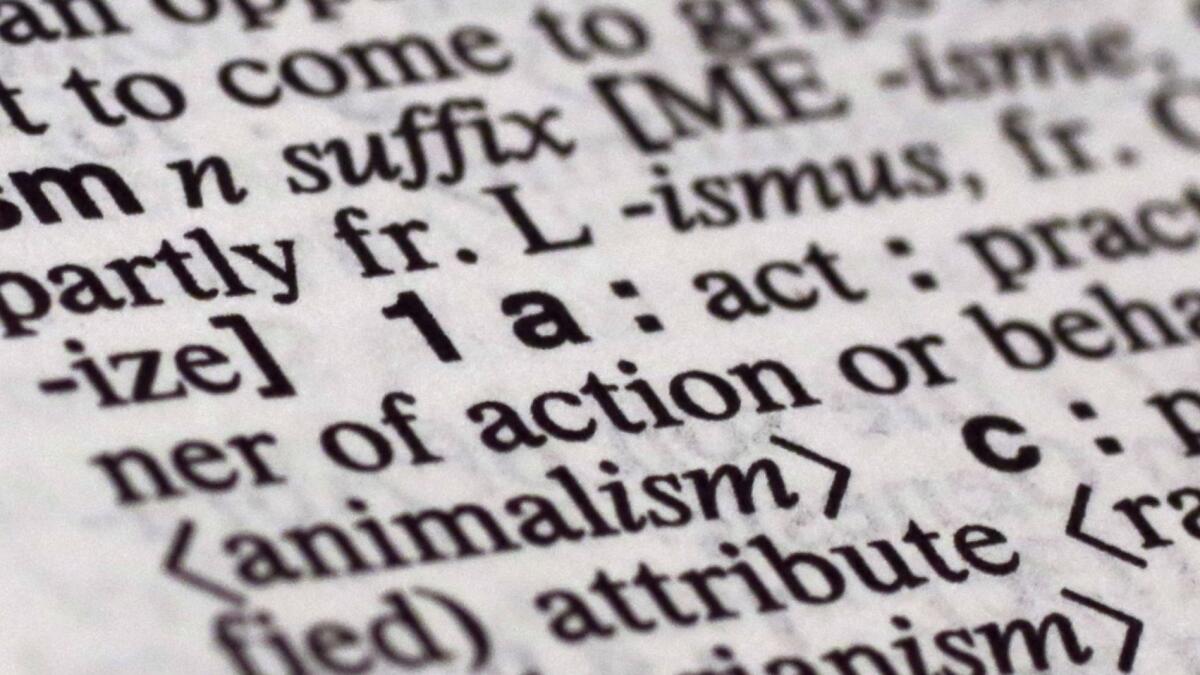Dictionary.com adds new words, including ‘cybermob,’ ‘Latinx’ and ‘dad joke’

JSYK, Dictionary.com added more than 300 new words and definitions to its website Wednesday, highlighting the influences of the internet and increased attention to social justice issues on the English language.
The new entries include abbreviations and acronyms like “JSYK,” a common internet expression that stands for “just so you know.” Also added was “JOMO,” defined as “joy of missing out: a feeling of contentment with one’s own pursuits and activities, without worrying over the possibility of missing out on what others may be doing.”(That term is a take-off of “FOMO,” or “fear of missing out.”)
Other terms originating on the internet include “crybully,” which the website defines as “a person who self-righteously harasses or intimidates others while playing the victim, especially of a perceived social injustice.” The goal of crybullies is often to incite a “cybermob,” or “ a self-perpetuating group of people carrying out a campaign of online harassment that often includes ridicule and shaming or hate speech and threats, in response to reported news, stated opinions, published images, etc.”
Questioning the motives of other internet users has become a favorite hobby of social media users, which has given us words like “tone policing” (“a conversational tactic that dismisses the ideas being communicated when they are perceived to be delivered in an angry,frustrated, sad, fearful, or otherwise emotionally charged manner”) and “virtue signaling” (“the sharing of one’s point of view on a social or political issue ... in order to garner praise or acknowledgment of one’s righteousness from others who share that point of view, or to passively rebuke those who do not”).
If you’re wary of wading into social media fights (and we do not blame you), you can always limit your posts to simple interjections like “welp” (“an informal variant of ‘well’ used to indicate disappointment, resignation, or acceptance”) or “womp womp” (“an expression used to dismiss or to mock a failure, loss, etc.”).
Many of the words added to the dictionary come from discussions of culture, identity and social justice. Among these are “Latinx,” a gender-neutral term defined as “of or relating to people of Latin American descent,” and “colorism,” which refers to “differential treatment based on skin color, especially favoritism toward those with a lighter skin tone and mistreatment or exclusion of those with a darker skin tone, typically among those of the same racial group or ethnicity.”
Conversations about race have brought about terms like “white fragility” (“the tendency among members of the dominant white cultural group to have a defensive, wounded, angry, or dismissive response to evidence of racism”) and “white lash” (“a hostile or violent reaction by white people to the advances or influx of other racial or ethnic groups”).
Not all the new words are so serious in nature. New terms on the lighter side include “bromosexual,” an adjective “noting or relating to a close but nonsexual friendship between two men, typically a heterosexual man and a gay man.” This kind of friendship could take the form of a “textlationship,” or “a relationship or association between people who text each other frequently, but rarely if ever interact with each other in person.”
And if you’re an older person trying to annoy a member of “Generation Z” (“the generation born after the mid-1990s”), you could always try telling a tried-and-true “dad joke” (“a corny and generally unfunny joke reminiscent of the types of remarks made by middle-aged or elderly fathers to their children”).
More to Read
Sign up for our Book Club newsletter
Get the latest news, events and more from the Los Angeles Times Book Club, and help us get L.A. reading and talking.
You may occasionally receive promotional content from the Los Angeles Times.






